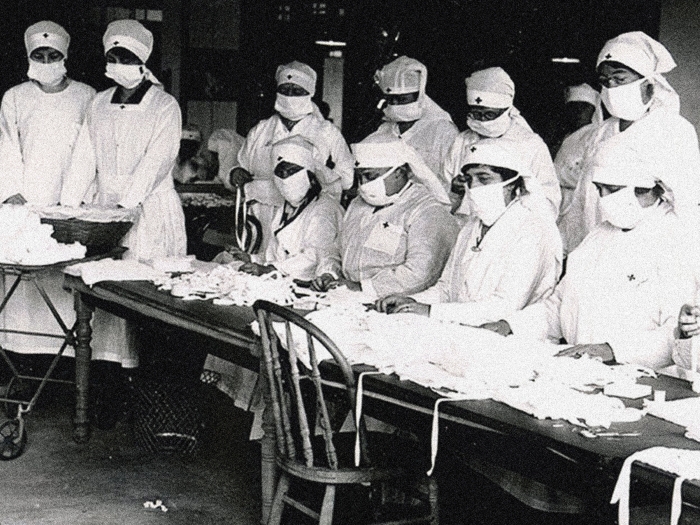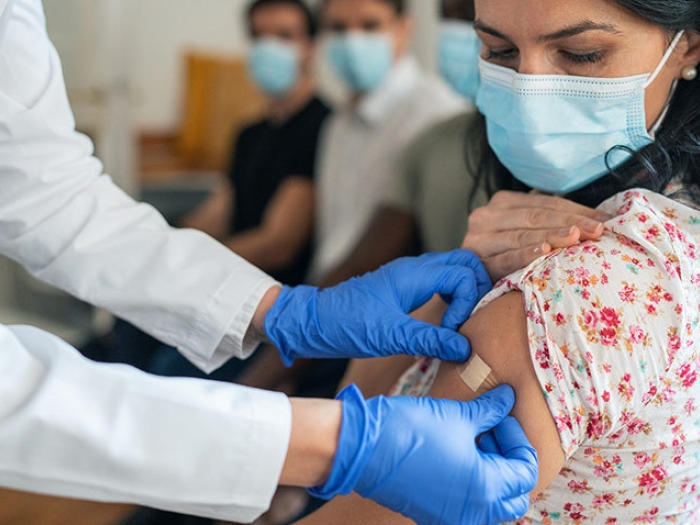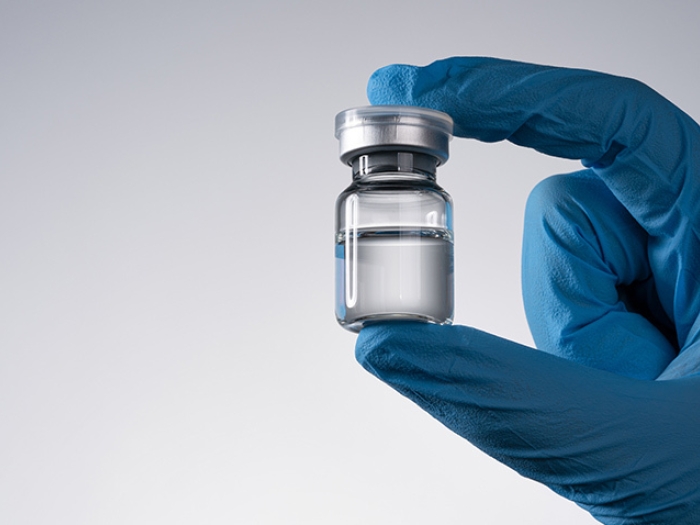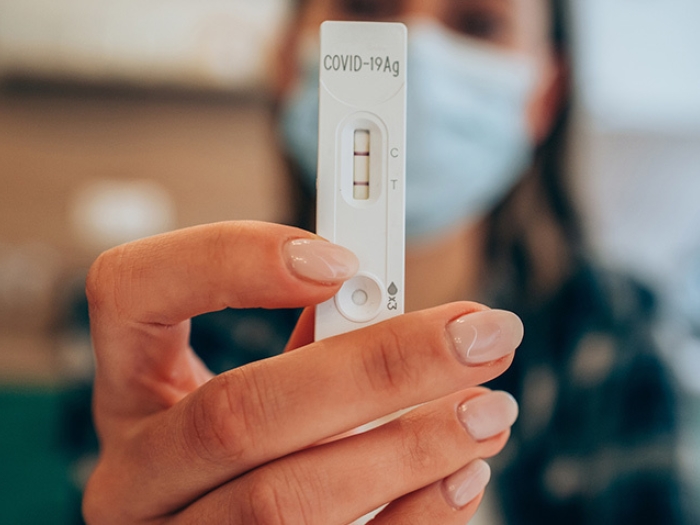With pandemic fatigue in full swing, myths and false claims about COVID-19 abound – experts offer a fact-check.
12:28 PM
Authors |
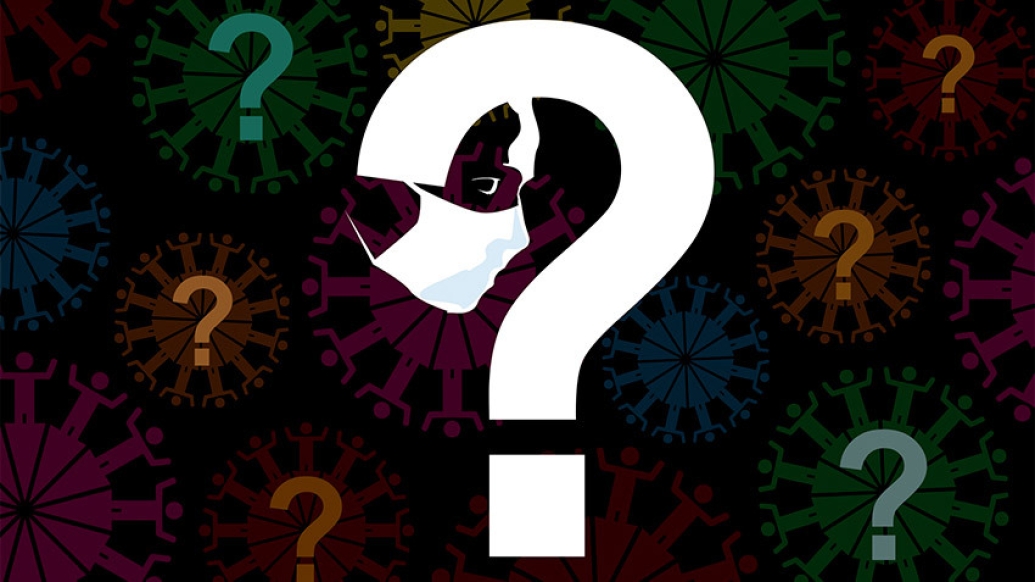
While cases are falling around the country, many places are still at high transmission levels with thousands of new COVID cases every day. Thankfully, just over 64% of people in the United States are vaccinated and have a much lower chance of developing severe disease or needing hospitalization.
The unfortunate news is that there are clusters of people who are not vaccinated, and many of those individuals are ending up hospitalized—or worse. Misinformation continues to spread online and in communities, and clinicians in primary care offices and in hospitals are having to dispel myth after myth about COVID-19.
Here, Michigan Medicine experts provide the antidote to misinformation as they reveal some of the more common misconceptions they've heard recently and provide the facts.
Myths about the COVID-19 vaccine
Myth: The vaccine doesn't work against the Omicron variant
Facts: The vaccines do work to prevent severe illness, need for emergency department visits or hospitalization, and death, especially with a booster for those who are eligible, says Laraine Washer, M.D., an infectious disease specialist.
With a booster, vaccine effectiveness against symptomatic infection is 60-70% when compared to no vaccine. The effectiveness of a primary series is less with Omicron and effectiveness does wane over time, so boosters are really important for protection against the Omicron variant. "Breakthrough" cases that happen in vaccinated people who get COVID-19 are typically much milder than they would have been without vaccination.
Myth: Having COVID-19 gives you as much protection as getting vaccinated
Facts: Even if you have been infected with COVID, there's no guarantee that you will be protected against becoming infected again. While recent research did find that people who were previously infected with COVID-19 had greater protection against the Delta variant than people who were vaccinated but not previously infected, this is no longer the case for the Omicron variant, which now accounts for almost all cases in the U.S. Vaccination, before or even after an infection, provides the best overall immunity. The "natural immunity" from a past COVID-19 infection varies greatly depending on many factors, while vaccine-related immunity has been studied in depth. And vaccination is much safer than risking a potentially severe bout with COVID-19, which can leave lasting effects.
Myth: A booster dose of the COVID-19 vaccine isn't really necessary
Facts: While the COVID-19 vaccines made by Pfizer, Moderna and Johnson & Johnson have proven to protect people from severe illness, hospitalization and death from COVID-19, the ability to prevent infection with any symptoms wanes (goes down) over time.
A booster dose can "remind" the immune system how to fight off the coronavirus. In fact, data from the current surge of cases caused by the Omicron variant shows that people who had received a booster dose before they got COVID-19 in December or January have had a much lower chance of serious symptoms leading to an emergency or urgent care visit, or a hospitalization.
Booster doses are now officially recommended for everyone age 12 and up who received their second dose of Pfizer or Moderna more than five months ago, and everyone age 18 and up who received their dose of Johnson & Johnson vaccine more than two months ago. In addition, 28 days after their most recent dose of any vaccine, an additional dose of vaccine is available to people over age 5 who have serious health conditions that affect their immune system (like cancer or an organ transplant) or who take medicines that reduce their immune response (like injected medicines for lupus and other autoimmune disorders).
Myth: COVID-19 vaccines cause viral "shedding" that infects people
Facts: The vaccines available in the U.S. do not contain viable COVID virus, so you can't shed virus from the vaccine.
Myth: The COVID-19 vaccines themselves cause variants
Facts: It's unlikely that vaccines contribute to the evolution of COVID variants, says Washer. "From real world data, we've seen that variants are emerging from areas of the world with low rates of vaccination."
Myth: COVID-19 vaccines cause immune damage
Facts: Vaccines do not damage the immune system. On the contrary, the COVID-19 vaccine enables the immune system to launch a stronger attack against SARS-CoV-2 if you are exposed, by letting it know ahead of time what to look for (the spike protein.) As a result, people who are vaccinated are less likely to get infected, severely ill or end up hospitalized.
Myth: COVID-19 vaccines affect fertility or threaten pregnancy
Facts: Hundreds of millions of people have gotten vaccinated against COVID-19 and no effects on pregnancy or fertility have emerged. The American Society of Reproductive Medicine, American College of Obstetricians and Gynecologists and the Society for Maternal-Fetal Medicine all strongly recommend that people considering pregnancy and those who are pregnant get a COVID-19 vaccine. Pregnant people face a very serious risk of illness, death or pregnancy loss if they aren't vaccinated at the time they get COVID-19.
Myths about COVID-19 testing
Myth: COVID-19 tests cannot tell the difference between the flu, colds or COVID-19
Facts: The most widely used COVID-19 tests are specific to SARS-CoV-2, the coronavirus that causes COVID-19, and do not detect other cold viruses or the flu. Sometimes physicians order testing for COVID-19 and influenza at the same time in patients who are especially vulnerable, so they can choose the right advanced treatment.
Myth: Rapid COVID-19 tests don't work well, and you have to get a PCR test to know for sure that you have COVID-19
Facts: While PCR tests are still considered the 'gold standard' for telling if someone has COVID-19, rapid tests are very good for telling if someone is contagious at the time they take the test and might be able to spread the virus to other people. Plus, rapid tests give you an answer in minutes, compared with days for most PCR tests.
"Having a positive rapid test indicates that you are infected with high enough levels of the virus to be contagious to others. This means that you should take precautions such as isolating from others," said Emily Somers, Ph.D., an epidemiologist at Michigan Medicine who has advised school districts and public health agencies on the use of rapid testing to steer quarantine and isolation guidance. "If you're negative on a rapid test, you may not be infected, or you might be in the early or late stages of an infection, before or after the contagious period."
She explains that PCR tests, which are based on detecting the genetic material inside the coronavirus, can detect an infection in the earliest stages, often days before any symptoms start. That's why they're recommended for people who have recently been exposed to a person who has already tested positive or developed symptoms.
But rapid tests look for a protein found on the surface of the virus (also known as an antigen), so the more virus there is in someone's nose, the more likely they are to have a positive rapid test and to be capable of spreading the virus. But as a result, early on during symptoms, you should not rely on a negative rapid test to rule out COVID-19 as the reason for those symptoms.
Rapid testing can be used to determine when it is appropriate for someone to exit quarantine or isolation – a strategy sometimes called "test to return." Taking the first of two rapid tests around Day 5 after symptoms have started is a common strategy (the first day of symptoms, or the day someone tested positive if they haven't had symptoms, is considered Day 0.) If the Day 5 test is positive, take another rapid test a day or two later, and stay home in the meantime.
Somers also notes that a person who has had COVID-19 recently may still test positive on a PCR test for days after their contagious period ends, or sometimes even longer if the person is immunocompromised. But positive results on rapid tests usually stop after about 10 days of symptoms.
Myth: Getting tested for COVID-19 costs money
Facts: Rapid tests are now available for free from the federal government and for purchase or pickup at stores and other locations. People with health insurance can file a claim to get reimbursed for any rapid tests they bought since January 15. PCR tests are also available for free at many locations to most people with symptoms or a recent known exposure; if you have health insurance the testing site may bill them for your test. You may be asked to pay out of your own pocket if you are only getting the test because it is required before traveling.
Myths about COVID-19 illness and testing
Myth: Deliberately exposing yourself or your child to the coronavirus to get it over with or gain immunity is a good idea
Fact: The COVID vaccine will give you or your child much safer, better and longer-lasting protection against serious illness than an infection. People who are not vaccinated are still at risk of a severe illness and death. And though children tend to have milder symptoms overall, if your child is too young to get vaccinated, you could put them at risk of severe illness or for a rare but serious complication called multi-system inflammatory syndrome or MIS-C.
In other words, if you get invited to a "COVID party" (a new take on the old "chickenpox party" idea that happened before a vaccine was available for that disease), say no.
Myth: Masks don't work to protect a person from getting COVID-19
Facts: Different masks provide different levels of protection, but all good-fitting masks provide some protection. The number of virus particles in the air around you, the amount of ventilation, and any gaps between your face and the mask make a big difference in your level of protection.
The most reliable protection comes from the mask you are willing and able to wear without taking off or fiddling with for the time period that you are around others.
The highest level of protection comes from N95 masks, which were in short supply early in the pandemic but are now readily available including for free from many stores that also offer vaccination, and public health and social service agencies. Even if you are surrounded by people who are contagious with the COVID-19 virus, a good-fitting N95 or KN95 mask can protect you for hours.
Surgical masks provide the next-best level of protection followed by multi-layer cloth masks made of non-stretchy material. Single-layer cloth masks and gaiters, and masks with valves on them, do not provide enough protection for the current Omicron surge.
If you have COVID-19 or you were recently near someone who does, you should also wear a mask to keep any virus particles that might be inside your nose and mouth from reaching other people.
Myth: Adults and kids don't get very sick from Omicron
Facts: Data from the Centers for Disease Control and Prevention indicates that length of hospital stays, and the percentage of COVID-positive people needing intensive care or dying, are lower with Omicron than during previous pandemic peaks. But because Omicron is spreading much faster, many more people are getting sick.
"A small percentage of a large number is still a large number," said Washer. The level of hospitalization and death from COVID-19 since the Omicron variant arrived in the U.S. shows that this is not a harmless form of the virus. What we do know is that people who are vaccinated, and especially people who have gotten booster doses, are much less likely to need emergency or hospital care than those who are not.
Myth: People in the hospital are severely ill with COVID-19, not of COVID-19
Facts: According to CDC, during the latest Omicron peak, more than 150,000 people have been hospitalized with COVID-19. Whether or not they had an underlying condition that increased their risk of experiencing severe symptoms, the large majority of these patients who were sick enough to need hospital-level care are there because of their COVID-19 symptoms. In other patients, a COVID-19 infection has resulted in the worsening of a chronic illness to a point where hospitalization is required. Those who weren't fully vaccinated when they caught COVID-19 would have been much less likely to need hospital care if they had gotten vaccinated earlier. While there are some patients in the hospital for other reasons, say a burst appendix, who also test positive for COVID-19 when the hospital tests them, they still need special isolation and added precautions for their care team.
Myths about COVID-19 treatment
Myth: It's OK for people to get COVID-19 because treatments are widely available now
Facts: Treatments for COVID-19 are in short supply across the country. Remdesivir is FDA approved for treatment of COVID-19 in patients at high risk for severe disease but can only be administered via an intravenous therapy in a healthcare facility.
There is currently only one monoclonal antibody, sotrovimab, that works against the Omicron variant, and it is reserved for patients at high risk for severe disease and must also be given by IV.
"There are fewer doses than individuals who might qualify and as a result, it is not possible for everyone who qualifies to receive it," said Washer.
Furthermore, while there are two FDA authorized antiviral drugs, Paxlovid and Molnupiravir, they must be administered within the first five days of symptoms appearing and can be difficult to find. Additionally, Paxlovid is contraindicated (meaning, can't be taken with) many common medications including certain drugs for gout, heart arrhythmias, cancer, certain statins and pain relievers.
MORE FROM MICHIGAN: Sign up for our weekly newsletter
Myth: Remdesivir causes kidney failure
Facts: "There is animal data suggesting a potential nephrotoxicity of remdesivir, but that is at higher doses than those given to humans," said Jason Pogue, PharmD, a clinical professor in the U-M College of Pharmacy. "It gets tricky because COVID-19 itself can cause acute kidney injury, which is why controlled studies are so important. Additionally, the short duration of therapy (five days) is further protective against any toxicity."
Myth: Remdesivir causes death
Facts: Remdesivir is recommended both by The Infectious Diseases Society of America and National Institutes of Health for the treatment of both outpatient (to decrease the need for hospitalization) and inpatient (to improve time to recovery) of COVID-19.
Myth: Ivermectin is an effective treatment for COVID-19
Facts: Ivermectin has not been shown to treat COVID-19. Pogue says there is a lot of poor quality and apparently fabricated data that suggested that ivermectin may be beneficial for COVID-19, but the best evidence to date, from multiple randomized controlled trials, have failed to demonstrate a benefit.
"There are other randomized control trials ongoing, and we await to see the results in those trials, however, the best evidence to date suggests no benefit."
Like Podcasts? Add the Michigan Medicine News Break on iTunes, Google Podcasts or anywhere you listen to podcasts.

Explore a variety of healthcare news & stories by visiting the Health Lab home page for more articles.

Department of Communication at Michigan Medicine
Want top health & research news weekly? Sign up for Health Lab’s newsletters today!

